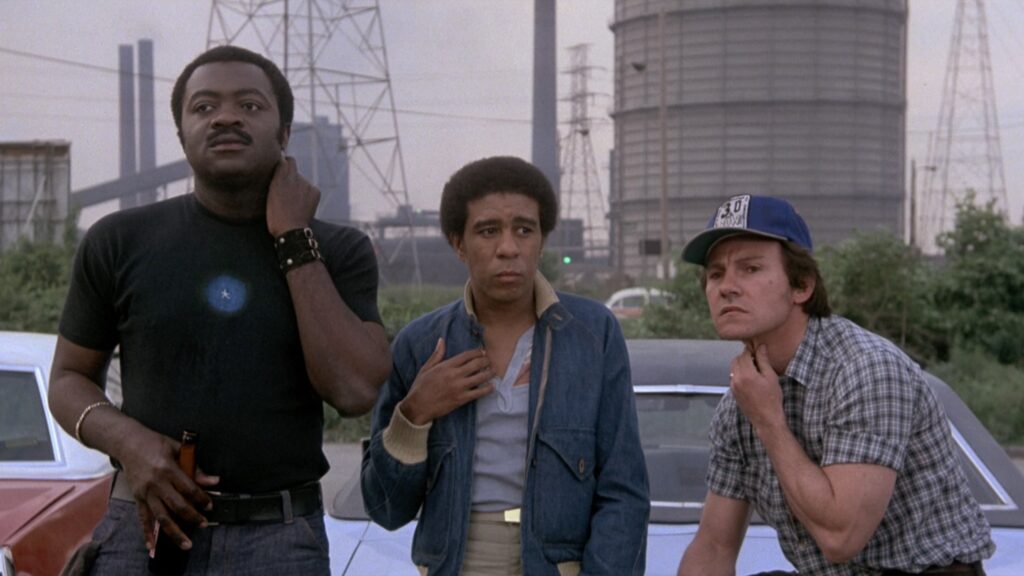After a few months of neglecting the 1978 Project in order to catch up with and recap 2020 films, we return to glory! Again. Yeah, so it’s been about a year and a half since this project began, but we are finally reaching the homestretch. If I do something like this again, I should try and make it time-bound (like I did for 50 Under 50).
For the uninitiated, I’m doing a deep dive into the cinema of the year of my birth (guess which year!) As of this writing, I’ve seen 83 films that were released in 1978. Not comprehensive, to be sure, but we’re getting respectable and we’ve only got maybe 5-10 more films I want to catch up with. The thing is, I keep finding new stuff I want to watch. This post covers a couple of doozies that I’d probably never have watched if it weren’t for this project, but which are impressive for movies encountered this late in the process.
I’ll say we’ll get to the traditional Movie Awards and Top 10 roundup sometime this spring, but who knows? I may end up watching 200 films from that year. In any case, it’s time to take a look at some of the1978 flicks I caught up with recently, so let’s hop to it…
Blue Collar – A group of assembly line workers at an auto plant, plagued by growing bills, a disinterested management, a corrupt union, and the ever-persistent IRS, conceive of a plan to rob their union. Naturally, things don’t go as planned. After making a name for himself by writing classic scripts like Taxi Driver and Rolling Thunder, Paul Schrader had built up enough credibility to direct his own scrip this time around. In case you can’t tell by the plot description or the other films he’s worked on, Schrader is a cynical guy, and this film is a stark condemnation of, well, everything.
It’s so grim that I wonder if Schrader’s non-directorial stuff tends to be more successful because some of his edge gets rounded out by collaboration. Of course, “success” isn’t necessarily the best arbiter of a film’s worth, and I will say that this movie, while bleak and uncompromising, is a story-first affair. Schrader himself has commented on how this film had to “operate in the area of entertainment”, even if he was saturating the film with political realities. The result isn’t exactly a fun watch, but it’s engrossing and insightful.

It helps that Schrader cast a trio of ringers as the leads. Richard Pryor, Harvey Keitel, and Yaphet Kotto are all phenomenal as the down-on-their-luck workers seeking a big score, only to find themselves ensconced in a convoluted machine that they can’t escape. And that’s before the back-stabbing, corruption, and murder. Visually, Schrader presents the story with blunt realism, though he makes room for bitter irony, like the shot of a billboard ticker that tallies Chrysler’s production numbers. Petty union squabbles pitting “…the lifers against the new boys and the young against the old. The black against the white.” None of that matters to the numbers. Know your place in the scheme. Schrader’s incessant cynicism is often hit or miss with me, but for whatever reason, this one hits hard. It’s a difficult movie to recommend, but it’s quite good if you’ve got the stones for it. ***
Big Wednesday – You wouldn’t expect this meandering movie about the trials and tribulations of three surfers living through the 60s and 70s to come from a guy like John Milius (more famous for bombastic fare like Conan the Barbarian and Red Dawn, not to mention some of the most iconic, badass lines in cinema history), but here we are. In some ways, it resembles films like American Graffiti (made by Milius’ pal George Lucas); a nostalgic trip down memory lane.
Big Wednesday has a more focused core of characters though, and it covers a much larger swath of time. As a result, it does provide a little more insight and character depth. Again, this is helped by solid casting of the three surfing friends: Jan-Michael Vincent, William Katt, and Gary Busey. All three are doing surprisingly good work here, as they’re not exactly known for subtlety in their careers. Jan-Michael Vincent gives the best performance (in the movie and perhaps of his career) and displays the most range. It’s amusing to consider Busey in this movie and contrast with his later role in Point Break. Even bit players like Sam Melville as the surf board guru, Bear, puts in a career-best performance.

It’s maybe a tad long, and I can see why it wasn’t successful at the time, but it appears to have garnered a following amongst film nerds. Take, for example, Quentin Tarantino:
“I don’t like surfers. I grew up in a surfing community and I thought surfers were jerks. I love Big Wednesday so much. Surfers don’t deserve this movie.”
This sort of movie (light on plot, high on character), isn’t usually my thing, but like Tarantino overcoming his distaste for surfers to like this movie, I found myself enjoying it quite a bit. ***
Heroes of the East – A Chinese man is thrust into an arranged marriage with a Japanese woman. Cultures clash, and the man inadvertently challenges her entire family’s martial prowess. Thus he must prove that Chinese Kung Fu really is superior to Japanese martial arts through a series of duels. Yes, another in the seemingly endless reserve of Hong Kong martial arts flicks made in 1978 (and we’re not done yet!)
To be frank, I’m not really qualified to comment on the whole culture clash element of the story. I’m aware of enough Chinese/Japanese history to see why this rivalry could emerge, but again, not really qualified to engage in specifics. As an American who is constantly running up against other cultures (speaking generally here, not in terms of specific culture war topics that are so hot these days), the rather extreme response by both parties seems a bit overheated, but then, you know, you wouldn’t have a movie if everyone would act reasonably. Also, there’s that Chinese/Japanese history to contend with.
The main attraction of these films are the action set pieces anyway, and this one has them in spades. It’s not the best of 1978 nor is it one of the first I’d recommend, but it’s a perfectly cromulent entry in the genre and worth checking out for fans of this sort of thing. **1/2
The Hypothesis of the Stolen Painting – Two narrators discuss the possible connections and controversies surrounding a series of paintings. This French arthouse film is literally about actual art, so it is incredibly pretentious. Luckily, there are some fascinating ideas at its core and it is blessedly short, which keeps things moving along well enough. The visual convention of one narrator walking through three-dimensional reproductions of each painting is a fantastic touch, and really helps illustrate the story behind the paintings (and the connections between paintings). The notion that you could obsessively study each painting and find enough connections between them to infer that there is a missing painting in the progression is quite engrossing… but it ultimately has nowhere to go.
Watching this, I was consistently reminded of Rembrandt’s J’accuse, a documentary about visual literacy and obsessively breaking down the story behind a famous painting. Both films are pompous and stilted, but they cover interesting topics and they do so in visually inventive ways. I’m really glad I caught up with this film though, and I would really love to watch it again if it ever gets a good release (there are DVDs, but to my knowledge, there has not been a Blu or 4k release). **1/2
Shaolin Mantis – Look, there’s a whole thing about the Qing dynasty sending a spy to infiltrate rebels and he falls in love with the rebel leader’s granddaughter and so on… But really this is a movie about how a defeated martial artist invents a new style by observing and imitating a praying mantis. Then he uses that to seek revenge. Yet another Hong Kong martial arts movie released in 1978.
At this point, I could probably do a top 10 Hong Kong martial arts movies of 1978 list (and still leave off, like, 20 movies). Would this list make that top 10? It’s possible, but it’d be towards the lower end of the list. This is more because there’s just so many really great entries in the genre though. Shaolin Mantis is entertaining and the action is great. As a story, it doesn’t quite hold together, but it’s functional enough and as already established, the story is really just an excuse to get to the action. Which, again, is copious and well done. I liked this a bit better than the aforementioned Heroes of the East, but I’d put it in the same territory of movies that aren’t essential, but which could be interesting for students of the genre. **1/2
Rich Little’s Christmas Carol – It’s Dickens’ classic story, with Rich Little playing basically every part himself. He plays each part as himself doing an impression of someone else playing the part. Does that make sense? So Rich Little is playing Marley by doing an impression of Nixon playing Marley. It’s an insane conceit and it makes the process of watching the movie more of a meta-exercise than an entertainment in itself. I mean, we all know A Christmas Carol and this isn’t a particularly good retelling of it, but I couldn’t help being transfixed by the sheer audacity of the thing.
It’s also a bit of a time capsule in that most of the impressions aren’t exactly timeless. W.C. Fields as Scrooge! Truman Capote as Tiny Tim! Many of these weren’t recognizable to me, and it’s also not like Little’s impressions are that good. Though I did kinda appreciate that the three ghosts of Christmas were all famous screen detectives. It adds an extra meta level to the proceedings. Rich Little impersonating Peter Falk playing Columbo as the Ghost of Christmas Past! Why famous screen detectives? Damned if I know, but I can’t help but watch . Not really recommended, except for people interested in this deeply weird gimmick. I think this sorta defies rating?
There are definitely a few more films I want to track down before I start in on the Movie Awards and Top 10 list, but I’m guessing we’re in the homestretch now, so it shouldn’t be too long. Because I know you’re all on the edge of your seat. Just keep calm, it’s coming.